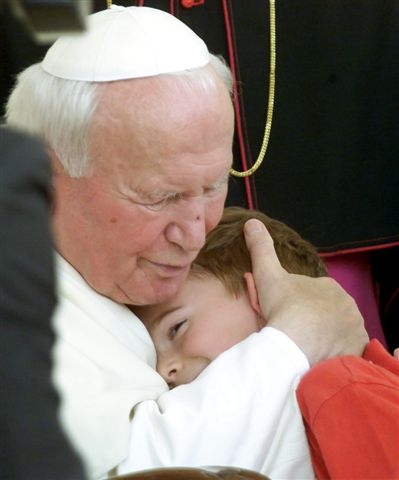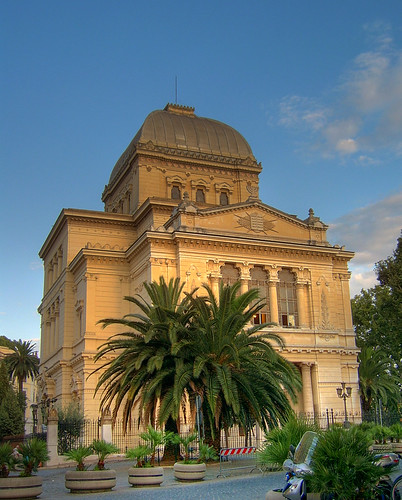
With Islam and Europe back in the headlines following the Swiss vote over minarets, readers might be interested in this unpublished interview I did earlier this year with Tariq Ramadan, the well known Muslim apologist and scholar who also is Swiss.
Ramadan was in Rome to speak at a conference on the Holy Sites in the Holy Land. The interview was originally for Newsweek but got bumped by something else, though excerpts were used in
The Holy Land Review.
How useful was the Catholic-Muslim Forum [the meeting had just been held]? Did it match your expectations?We must take it for what it was. It was the first step of a dialogue and we decided we would continue in a Muslim majority country and now there are also other countries willing to work with us. I spoke with Cardinal Jean-Louis Tauran [head of the Vatican’s interreligious dialogue council] about this. We started with love of God and love of neighbour which was a starting point, but some of the questions this raised were quite important – reciprocity, freedom of belief and worship. All of these issues will be part of the discussion, but the starting point was to acknowledge the fact that we are living in a period beyond the tension created after the Pope’s lecture and the channels are open.
Would you agree that that lecture was actually the stimulus for this and other dialogues taking place today?Yes. I responded to the Pope’s lecture by saying that the heart of the lecture is not violence. All of the discussion within it is about the roots of Europe - Greek, Christian rationality. At the end it was a philosophical lecture, which many people didn’t even read, but it was a very important one because he is very knowledgeable and very serious about what he said. So we needed a very serious discussion. Then, the consequences in the long term have been much more positive than negative because it’s opened doors to deep discussions on many important levels.
Would you agree that it went very much to the roots of a possible clash of civilizations? If we take the current tensions in Europe over the building of mosques: the West sees these as a threat because Christian identity is so weak, while Muslim identity is very strong. As someone said: the Pope was pointing out that we have people belonging to a religion that has gone ‘cold’ in danger of clashing with one that is now ‘hot.’ Exactly. By being scared of the present, you rebuild the past by saying these are our roots. But I think it’s not only this. Christian, Greek, Jewish, Muslim – all this heritage is there, so I think he’s putting forward a ‘reduction’ of the past, because there are some fears of the present. So this is what the Pope said, but at the same time, Cardinal Tauran said recently in southern Italy that God is coming back [into society] through the presence of the Muslims. So it’s positive.
But wouldn’t it be right that Christianity be re-born in the West to give the West a stronger identity, and thereby minimize such tension?I think you’re completely right. There’s a sense of alienation with regard to its own societies, and they are saying: ‘The Muslims are coming and they are perceived as assertive and confident, so we are on the defensive.’ So I think it’s up to Muslims to make it clear that what they want is to remain themselves and not to colonize the country or Islamize Europe. This is what I have been saying for years now – that I’m just trying to be a ‘European Muslim.’ But by being a ‘European Muslim’, I want to help Christians to be better Christians, and even the rationalists to be better rationalists, by having more consistency. What we need today is a world of witnesses of their own philosophy and beliefs.
And to be genuine, too?Exactly. This is what I would like and this is what the world needs to be today – a world of testimony. It’s quite clear there is a sense of witness that’s losing ground in the Christian tradition and this is why we have to take the Pope’s statements very seriously and very sincerely, because he’s very sincere on that.
Yet many Muslims still say, including yourself, that the Pope’s Regensburg lecture was a mistake and that you regret what he said in quoting the Christian emperor’s words. I never said it was a mistake.
But many Muslims have said it and still say it.Yes, in many instances. But I said it was not a mistake because I knew him when he was a cardinal. He’s very consistent. He’s a theologian of the highest level. This morning Cardinal Cottier was here [former theologian to the Pope]. Cardinal Cottier was my professor of theology. I studied Kierkegaard with him and he was my professor there for three years. He’s consistent as well and there’s a philosophy here, a religious understanding that you just have to respect the other. I may disagree with this reconstruction of the past, but I disagree out of respect and with respect. I think this is what Muslims should understand. It was not a mistake but a statement on two things: a take on history, and a take on the current situation facing Christians in Europe.
But why are you opposed to the reconstruction of the past that the Pope advocates? Isn’t that what Christianity has in many ways lost, that connection with its past.Yes. A reconstruction of the past based on an objective take on the past is fine. But a reconstruction of the past because you are scared of the present is problematic.
How do you know that’s the case? Isn’t the Pope wanting to reconstruct the past precisely to bring peace? No, because by [him] saying objectively that the roots of Europe are Greek and Christian, it’s a reconstruction of the perception that there is an alien element in Europe today which is Islam which is problematic. If you’re serious about philosophy and the history of thought, you cannot say that.
But rather remembering that Islam is part of European history?Of course. So I respect the fears that are reconstructing this past, but I disagree with the substance.
Turning to the election of Barack Obama, do you think his presidency could help bring great strides in terms of interreligious dialogue with Islam, and perhaps from that, bring peace in the Holy Land?I wrote an article just after his election saying we have to be full of hope but without naivety. The room for manoeuvre is quite narrow. I am sure things are going to improve because, really, after eight years of the Bush administration, it cannot but improve. But still I doubt that we are facing a revolution and new things, and in interreligious dialogue in the Middle East, I don’t see him resisting the various lobbies. Let me be clear: I’m not speaking about the Jewish lobby but the pro-Israeli lobby and APAC.
You’ve said that religious leaders, academics, and politicians need to work together – do you see a forum of all of these leaders as the way forward to help build peace in the Middle East? Yes, a platform I would say. Religious people should listen to politicians, and politicians should have in mind religious people and intellectuals, and intellectuals should be close to the reality.
Would you say a platform similar to that is already being pursued by King Abdullah of Saudi Arabia?No, I think it’s very far from that. It’s very formal, this ‘alliance of civilisations’. Now there is this competition between governments, Jordan and Saudi Arabia. I wouldn’t expect this platform to come from a specific government. A government could facilitate the process, but I would rather it were led by scholars, or something more independent.
Some have said that King Abdullah looks upon the Catholic-Muslim Forum as lacking authority because it’s just a group of scholars who have come together.Yes, and the other group is saying that what King Abdullah is doing is just politics and it is not involving the communities. Both are right, in fact.
What is your view on the argument that the crisis within Islam must be resolved before any fruitful interreligious dialogue with Islam can take place?I don’t think it’s a concomitant process. It’s not: just because you don’t have this, you cannot have the other thing. I think it’s even the opposite: by being involved in interfaith dialogue, it helps. This is my own experience. I’m dealing with the world and I’m living here so I’m challenged and I come back to my tradition and it’s a two-way process. I’m sure as well that through this process, we will be more open to the dialogue – it’s a virtuous circle. It’s two dimensions and we really have to go through both at the same time.
What is your view of Magdi Allam and his very negative comments about Islam?He thinks that because of his origins – he’s from Egypt – he can be as critical as he is. He is an essentialist, he thinks that Islam poses a problem, and he’s very tough. He’s very much taking an American neo-con line. We have to take him for who he is and look at his ideas. His ideas are really neo-con ideas that Islam is a problem, per se, and he is building things that are not based on truth.
Would having someone like him, and extremists on the Islamic side, in the same forum be beneficial or is that impossible?I think it’s impossible to do and it’s not beneficial because they would be caricatures of the true dialogue. They are representing polarisation, per se, and they are nurturing themselves on the two poles of the spectrum. I would say this is not the way forward.
But some would argue these groups are the protagonists of conflict so should be included?Yes, but we are building peace.
But without them, is that possible?Of course because we have to show that they have a political agenda, he [Allam] has a political agenda, and there are others nurturing each other. His legitimacy is coming from the other side, and the other side is using him. So I would say: ‘OK, go ahead, let us have a radical voice in between which is vocal, which is perceived and heard and which is constructive.’ I wouldn’t see anything positive coming from a dialogue [of extremists]. In fact, they dialogue by not talking – their dialogue is not to dialogue. This is exactly what they want.
Do you feel threatened at all by extremists for your moderate position? No, I’m criticised on both sides. Some Muslims criticise me by saying I have left Islam while some Westerners say I am too much of a Muslim fundamentalist. This is the very meaning of a bridge, that on both sides of the river we have people who not happy with you.
Isn’t a major problem here that there isn’t a central authority in Islam?No, there is. To tell you the truth, people who like what I am saying say: ‘Oh, you are on your own.’ That’s not true. We are not structured, but the mainstream, the silent majority, is following this way. Everywhere I go, from Muslim majority countries to the West, there are always people coming and listening. But we are completely paralysed by the voice of the extremists who are polarising. This is why we have to come together.
And then you will have more central authority?Of course, or we are not facing up to our responsibilities.
So you’re optimistic about the future?Yes, I am always optimistic.

















